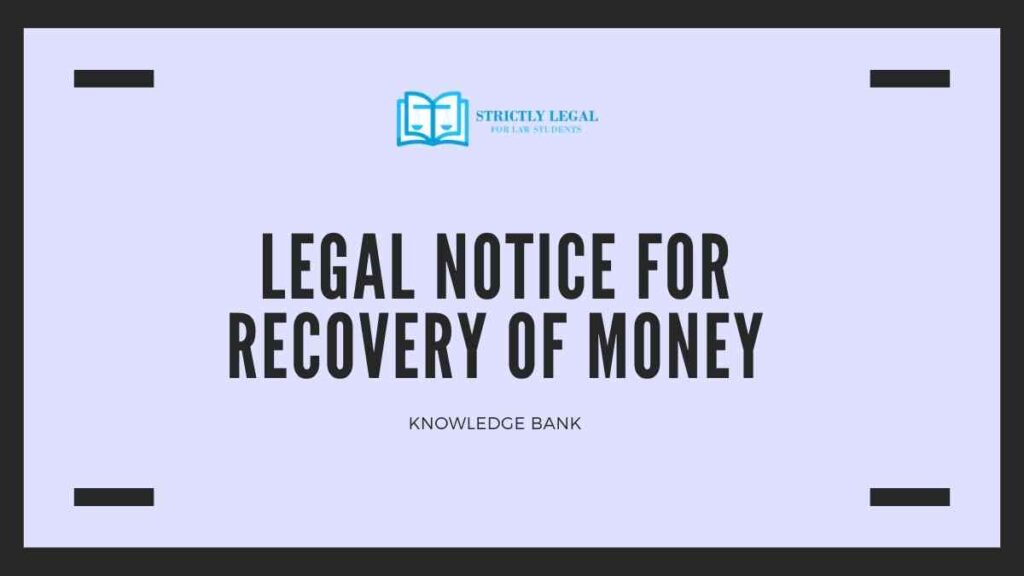A legal notice for recovery of money is generally a formal communication and a sort of deterrence between one party(plaintiff) warning the other(defendant) before proceeding with any legal action in order to receive their debt. The most usual problem among people is a friend not giving back their money. Unbelievably enough, you can file a legal notice against him/her too. To be precise, legal notice to get back your money can be filed to anyone, may it be your friend, tenant, employer etc.
Recovery of money acts as a restoration to the person who has to recuperate his debt due to the default.
There can be several situations where sending a notice or filing a suit becomes necessity. For example, if a tenant doesn’t pay the rent to its landowner after given ample time for paying, as a result a huge amount is ensued which is entitled by the landlord to receive. Talking about when any employee absconds with the money, a domestic enquiry will be commenced, sending a show cause notice to the employee’s residential address.
Legal Notice for recovery of money Format
Here is a sample format for recovery of money legal notice:
Date:_____________
To,
[Opposite Part]
My Client: Mr. VAKIL.TECH, presently residing at 52, Kandivali West, Mumbai, Maharashtra – 400067.
Subject: Legal Notice of Demand
Sir,
Upon instruction and on behalf of my Client, I write to you and state as follows:
- That my aforesaid client is operating a business at Andheri West, Mumbai -400061.
- That my Clients started to wind up their business concern by the end of financial year 2020-21, and having left with some unsold stock of materials, contacted you for the purchase of the same.
- That you being a long-standing supplier to my Clients’ business, agreed to buy back the stock at cost price, being valued at around Rs. 1,20,000/-. Accordingly, based on mutual understanding, my Client dispatched the stock by way of courier on 17.05.2021 which was duly delivered to you at your commercial address at Weavers Colony, Behind Municipal School, Mangalagiri, Guntur, A.P – 522503 on 25.05.2021.
- Subsequently, my Clients placed assurance on the mutual understanding that you would make payment for the stock sold to you within a period of 90 days. Thereafter, you defaulted in the payment of my Client’s legitimate dues on several occasions and have been stalling your obligations for over a year.
- That my Clients contend that they have been lenient yet diligent in their follow-ups with you, but your attitude continued to deteriorate over time. Finally, my Clients contend, that when you were confronted on 25.04.2022 regarding the payment, you outright refused to provide a concrete answer, and you have severed all means of communication ever since.
- That the agreement between you and my Clients form a legally enforceable contract where time is of the essence. Your delinquent approach and subsequent refusal is patently illegal and iniquitous; and you are liable to discharge your obligations in favour of my Clients in a timely manner.
- That your conduct has lead my Clients to reasonably apprehend that you have acted with mala fide and have misappropriated the stock delivered to you in good faith. My Client apprehends that your fraudulent conduct was on account of my Clients’ urgency to dispose their unsold stocks, and you never intended to pay for the same.
Under the given circumstances, you are hereby called upon to disburse in favour of my Clients, the entire sum of Rs. 1,20,000/- along with interest @ 10% p.a. in addition to Rs. 5,000/- as costs incurred for the issuance of this legal notice. In the event that you do not comply with the directives of this notice within 15 days of receipt, my Clients will be constrained to approach the appropriate authorities for the redressal of their grievances and the enforcement of their rights against you, including but not limited to appropriate civil and criminal proceedings, all at your cost and consequences, which please note.
Regards,
NAME OF THE ADV,
Advocate,
COURT NAME
This legal notice was drafted by the team at Vakil.TECH~ Send Legal Notice Online!
WHAT IS A MONEY RECOVERY SUIT?
Filling a suit for recovering your money is the most fruitful and methodical way to get your work done. The civil remedy to get back your money is by suing the defaulter, that is by filing a suit in the court of capable jurisdiction.
TIME PERIOD FOR FILING A SUIT
The time period for filing a lawsuit in order to recover your money is three years from the day of the cause of action arises. However, it is also upon the wariness of the Honorable court.
WHERE TO FILE A SUIT FOR RECOVERY OF MONEY?
After reading the article till now, the probable question you have in mind could be the place to file a lawsuit for recover of money. It is as simple as it sounds. The “jurisdiction” for filling a suit can be decided keeping in mind about the place or the location from where the defaulter belongs to and the pecuniary limit that the Hon’ble Court can have power over it.
Territorial Jurisdiction:
The most essential ingredient while filing a suit against the defaulter is that whether the defaulter falls under the territory of the Court. Under this type of jurisdiction, the geographical limits of a court’s authority is distinctly set forth and enumerated. Hence, the Court cannot take up or exercise any authority beyond it’s territorial limits.
As per the “Code of Civil Procedure, 1908” a suit can be filed at the following territorial jurisdiction-
- Where the money defaulter (defendant) inhabits.
- Where defendant runs a business or his earning.
- Where the cause of action arises. (wholly or partially)
Pecuniary Jurisdiction
The meaning of “pecuniary” is related to money. This type of Jurisdiction tries to monologue if a court of law can try suits of that monetary value or amount of the suit in question. For example, the Pecuniary Jurisdiction of Kolkata City Civil Court and Calcutta High Court is valued between Rs. 10 lakhs and 1 crore. However, first territorial jurisdiction is kept in mind before proceeding for filing of a suit, followed by that pecuniary jurisdiction.
LEGAL ACTIONS THAT CAN BE TAKEN AGAINST MONEY DEFAULTER
- The first step is as simple as that I.e., inform the defaulter about the amount of money that he debts in the form of a formal notice containing the plaintiff’s personal details, details of cause etc.
- Try reaching out to places like Vakil.Tech for better and instant suggestions and drafting of such notice.
- In cases, where the defaulter doesn’t respond to the plaintiff’s notice, a case against the defaulter can be filed.
STATUES TO FILE A CASE AGAINST THE DEFAULTER
Code of Civil Procedure: Under order 37 of CPC, 1908, asks for a borrower to file a summary suit which is the most “go-to” way to recover money. The defaulter will have ten days from the day of the filed suit to appear before the court, failure of which the Honorable court assumes that the alleged claims of the plaintiff is true and valid and he is remunerated.
Negotiable Instruments Act, 1881: This act focuses chiefly on those cases where your cheque that has been sent by the employer has been bounced once and you’re trying to recover money from them. Section 138 of the Act punishes the drawer of the cheque who had no prima facie intention of making a payment and draws a cheque that will bounce, hence section 138 foists criminal as well as civil liability on the drawer.
Indian Penal Code,1860: Penal Laws has a number of sections which provide remedies to people whose money has been defaulted for some excuse or the other, which are punishable under the Indian Penal Code, 1860. For proceeding under this act, you need to contact Vakil.Tech for clear and certain advise and actions.
Insolvency and Bankruptcy Code, 2016: Proceedings or suits for recovery of money can also be filed taking help from IBC,2016 with the help of Vakil.Tech where defaulters are being tried on with a rigorous time-bound manner, which is less than a year.
Indian Contract Act, 1872: If any individual swindles or misrepresents or an indemnifier is unable to carry forward the contract for a potential insolvency from their end, Section 73 of the Act might be taken into consideration for its specifications for providing loss damages for the breach of contract.
FAQs
- What if the legal notice is not accepted?
Refusal of Legal Notice is unlikely, but it not “impossible” to happen. If ever, your notice gets turn down, you need to contact a lawyer from Vakil.Tech as soon as possible to get your work done with expertise professionals.
- What happens when one doesn’t respond to your legal notice?
If the defendant does not respond to your notice within a reasonable/stipulated period of time, the plaintiff can file a case against the defendant in a proper court of law.
- What can I do if someone doesn’t return my money?
You can set out a legal notice to him asking him to return your debt in a stipulated period of time, if he refrains from paying back the sum, a civil suit can be filed against him. However, you can also file an FIR for cheating.
- How do you file a case if someone owes you money?
The lender can always file a civil suit for getting back their money he owed from the defaulter through a promissory note or a loan agreement under Order 37 of CPC, which allows the lender for filling a civil suit.
- What can you do if a family member owes you money?
Asking for your own money back from a friend or someone from your family can be uncomfortable indeed, but sometimes, you have to take necessary actions when it is the eleventh hour. One to one confronting them is the first step for sure, and reminding them at regular intervals. If they still don’t pay you back, and you wish to proceed legally, you can always send a legal notice.

Law student.
Turning legal insights into engaging narratives.





